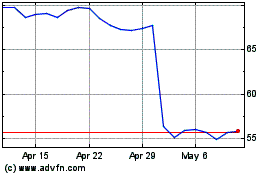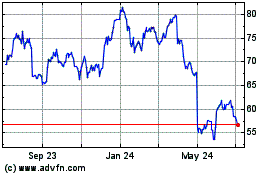By Paul Ziobro
CVS Health Inc. is getting a taste of its own medicine.
The biggest U.S. drugstore chain warned that it stands to lose
40 million prescriptions next year as deals signed by rival
Walgreens Boots Alliance Inc. with other participants in the drug
supply chain shut out CVS pharmacies.
The company, which had pioneered a business model that put drug
insurance and nearly 9,700 pharmacies under the same roof, lowered
its profit outlook for the rest of this year and next. Shares
tumbled 13% in early Tuesday trading.
Chief Executive Larry Merlo said two recent partnerships that
Walgreens struck with health plans that entirely excluded CVS
drugstores from their networks were the main reason for the
expected decline in prescriptions. CVS filled 1.03 billion
prescriptions in 2015, the last full year available, up from 722
million five years earlier.
"We have always said that our last scripts are our most
profitable," Mr. Merlo said on a conference call with analysts.
"Unfortunately, this means that the scripts we lose will tend to be
our most profitable scripts."
Pharmacy-benefits managers, which include companies like Express
Scripts Holding Co. and CVS Health's Caremark, operate as middlemen
between insurance companies, corporations that pay for health
coverage, drugmakers, and pharmacies. They help process claims for
prescriptions drugs while also negotiating with drugmakers and
insurance companies over the price of medications.
By owning Caremark as well as thousands of drugstores, CVS
Health has been able to closely align both businesses to encourage
patients to fill their prescriptions somewhere within the CVS
empire. For instance, under its Maintenance Choice program,
patients can get 90-day prescriptions filled either through the
pharmacy-benefit program's mail-order business or at CVS stores at
the same lower price.
But that leaves an opening for Walgreens to partner with other
pharmacy-benefit managers. "CVS can't have that same relations with
other competing PBMs," said Adam Fein of Philadelphia-based
Pembroke Consulting, who tracks drug distribution. "Walgreens is
using CVS Health's strengths against it."
Under CEO Stefano Pessina, Walgreens Boots has been aggressively
pursuing deals that make its pharmacies part of preferred networks
where patients can fill their prescriptions at a discount. It has
had a number of wins, too, including becoming the preferred
pharmacy for United Healthcare Inc.'s OptumRx and for Prime
Therapeutics, which manages drug benefits for 14 Blue Cross and
Blue Shield health plans.
Last month, Walgreens signed a deal to become the preferred
network for Tricare, the Defense Department's health-care network,
supplanting CVS Health. It has also struck a deal to acquire the
No. 3 U.S. chain, Rite Aid Corp., though the transaction awaits
regulatory approval. Walgreens filled 929 million prescriptions in
the fiscal year ended Aug. 31.
"Walgreens is trying to be the best friend of every PBM that's
not named Caremark," said Mr. Fein. Walgreens is courting
prescriptions because it wants to drive more traffic to its stores,
so it can sell shoppers beauty and other products. CVS Health has
been less willing to chase foot traffic with discounts, and even
encourages customers to fill prescriptions by mail.
Mr. Merlo said Walgreens' deals with Prime and Tricare cut out
CVS pharmacies entirely, and that weighs on profitability because
of the fixed costs tied to running the locations. It also means
fewer people coming into stores and spending money on snacks,
household items and other sundries.
But Mr. Merlo defended the CVS Health model compared with the
partnerships that Walgreens has made. "While they may get part of
the way there, we don't believe they can extract the full value
that we do through our truly integrated model," he said.
In 4 p.m. trading Tuesday, CVS Health shares were down 12% at
$73.53. The shares had already fallen nearly 15% this year, as
investors fretted over pushback to rising drug prices and unease
over the presidential election. Shares of Walgreens Boots fell 4%
on Tuesday.
CVS Health lowered its financial targets. For 2017 it now
expects adjusted earnings per share of $5.77 to $5.93. Analysts
polled by Thomson Reuters had expected earnings per share of
$6.52.
The Woonsocket, R.I.-based giant has increasingly relied on its
Caremark division for growth. In the latest quarter, CVS Health had
a profit of $1.54 billion, or $1.43 a share, up from $1.25 billion,
or $1.11 a share, a year earlier.
Revenue increased 15% to $44.62 billion, Revenue in the pharmacy
services segment, which includes Caremark, rose 19.2% to $30.4
billion.
Sales at existing pharmacy locations rose 2.3%, with a 3.4%
increase in prescription sales offset by a 1% decline in the
front-end of the business.
Austen Hufford contributed to this article
Write to Paul Ziobro at Paul.Ziobro@wsj.com
(END) Dow Jones Newswires
November 09, 2016 02:48 ET (07:48 GMT)
Copyright (c) 2016 Dow Jones & Company, Inc.
CVS Health (NYSE:CVS)
Historical Stock Chart
From Mar 2024 to Apr 2024

CVS Health (NYSE:CVS)
Historical Stock Chart
From Apr 2023 to Apr 2024
